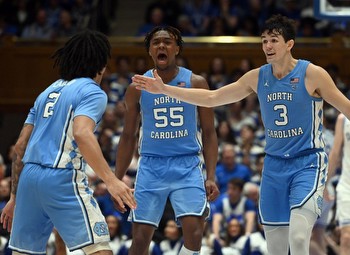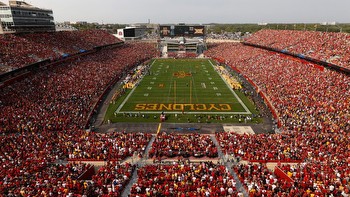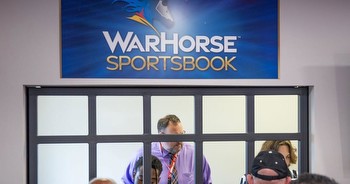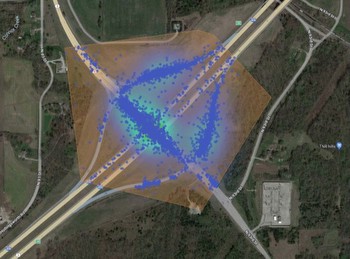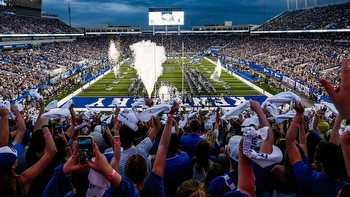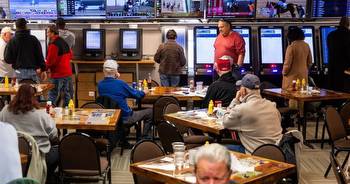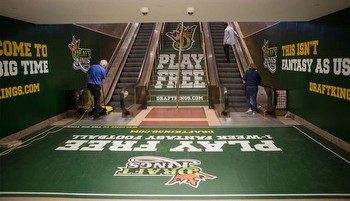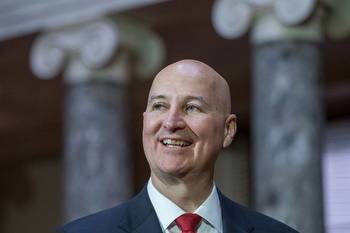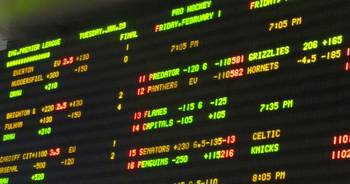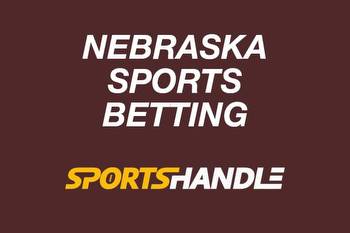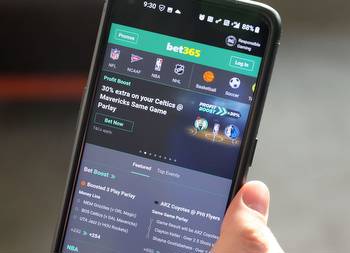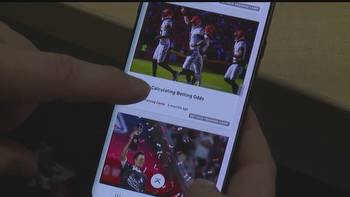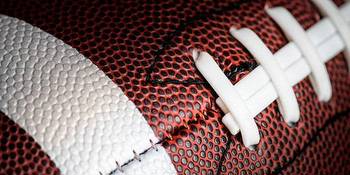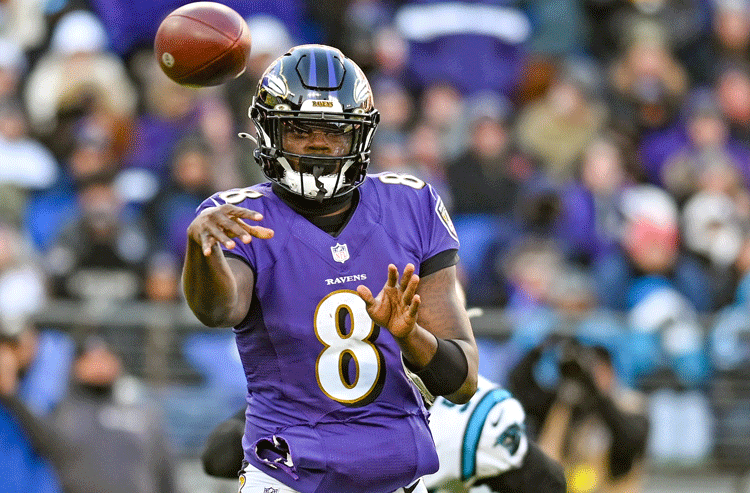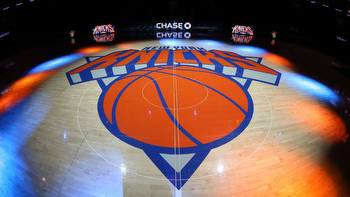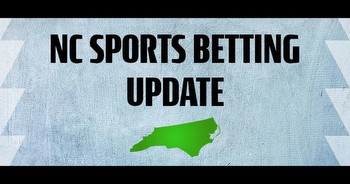Nebraskans cross river to use sports gambling apps in Iowa
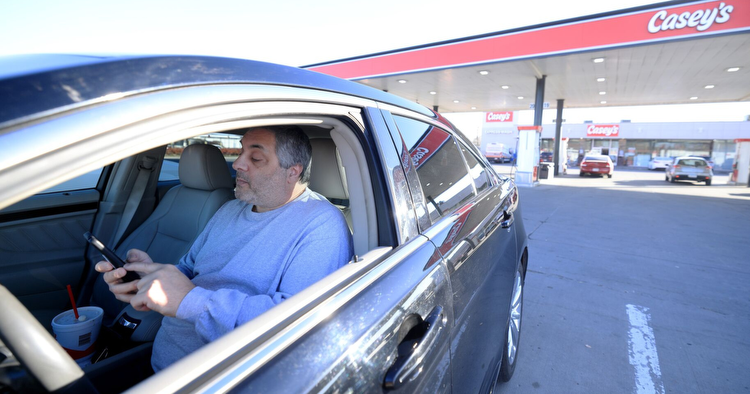
A remarkable thing is happening at a rather unremarkable highway exit on the Iowa side of the Missouri River across from Omaha.
The 130th Street exit on Interstate 680 is surrounded by farm fields and connects to gravel roads. It offers no convenience store, gas station or fast-food outlet to lure drivers off the highway.
But on a recent Saturday morning, a steady trickle of cars headed east across the Mormon Bridge from Nebraska, pulled off at the interchange and parked at the roadside.
As many as a dozen were parked there at a time, each driver pausing for several minutes before getting back on I-680 and heading back into Nebraska.
What's got them coming and going? Hopes of a payoff.
By crossing the river, Nebraskans can escape the geofencing that prevents them from placing a bet via mobile sports-wagering apps in their state. Under current Nebraska law, sports wagering is legal but limited. Bets have to be placed physically in person at the handful of recently opened racetrack casinos.
Geolocation analysis conducted for The World-Herald by GeoComply Solutions shows this rural Iowa highway exit is one of the places frequented by Nebraska sports bettors using mobile apps.
On Saturday, Nov. 18, for example, 2,300 geolocation checks involving 100 unique player accounts occurred at the interchange according to GeoComply solutions, which provides geolocation services to several national mobile sportsbooks. Geolocation checks are recorded at various stages of a user engaging with a legal sportsbook, including registering an account, logging in, and placing a bet.
Crossing the river to bet is not illegal, said Omaha City Attorney Matt Kuhse.
The two states have different gambling laws — similar to the marijuana laws that vary by state, Kuhse said.
"Here in the state of Nebraska, possession of marijuana is against the law," he said. "If you go into Colorado and possess marijuana, it's not against the law. You're subject to the laws of the state that you're in, whether permanently or temporarily."
In 2019, Iowa lawmakers made it legal to place bets on professional and college sports at state-regulated casinos and online through a mobile app.
Initially, new players had to register in-person at a retail sportsbook before they could use their online accounts. On Jan. 1, 2021, the law requiring in-person registrations expired, allowing new players to register through their favorite sports betting app.
Now people can register from anywhere, but the bettor has to be physically within state lines to place a bet.
In Nebraska, residents are able to open an account and deposit money into it while physically within Nebraska's borders, but they must be present in a state where sports betting is legal to place a bet.
On the DraftKings app, for example, opening an account on your smart phone is quick and easy. The app offers several options for depositing money. If you choose to put in cash, the app provides a map of the closest retail outlet to your location in the metro Omaha area where you can walk in, scan a bar code on your phone and deposit the money. These locations include convenience stores, pharmacies and discount stores. The money immediately shows up in your account.
Betting on sports requires an additional step.
Joe Anania of Omaha, 64, a retired UPS driver, regularly crosses the river to bet.
Anania lives downtown, so it's most convenient for him to cross the river on Interstate 480. He drives about a mile from his apartment to the Casey's convenience store at 35th and Broadway in Council Bluffs.
"I usually go there early, a few hours before the games start, to get coffee and a breakfast slice," he said.
He said it takes him a total of about 20 minutes to run over, bet and get back home, faster than if he drove to the nearest state-approved sports-betting site in Omaha — the WarHorse Sportsbook at 63rd and Q Streets.
He said he's been gambling his entire adult life. He has great fondness for the glory days of the Ak-Sar-Ben horse racing track in Omaha and even started a website on the history of the now defunct track.
He considers himself a responsible gambler. He said he knows the odds are against winning consistently, but he says he has made some big money a few times.
Anania said he bets on NCAA football and basketball, NBA, NFL and Major League Baseball.
"There are many moral and ethical pros and cons for sports apps, just like there are pros and cons for drinking alcohol, and playing the lottery and pickles," he said. "I am a libertarian and believe people should be able to spend their disposable money any way they wish, as long as it's legal."
Betting would become more convenient if Nebraska approved mobile apps, allowing people the freedom to bet anywhere, anytime, he said.
"I suppose that it would be easier to lose your money," he said.
Between Jan. 1 and Oct. 30, GeoComply Solutions identified 64,000 mobile sports betting user accounts in Nebraska. That doesn’t mean 64,000 residents have accounts. One user may have accounts with multiple online sportsbooks.
GeoComply data shows some idea of the scale of river crossings into Iowa.
The company identified 7,804 border crossings between Sept. 7, when the NFL season kicked off, and Oct. 30.
In light of the river crossings, some Nebraska lawmakers think it's time to look into the potential impacts of allowing mobile sport betting in Nebraska. Opponents of expanded gambling have said they'll fight any effort to broaden what's allowed.
"We know clearly that Nebraskans are going to continue to wager on athletics," said State Sen. Eliot Bostar of Lincoln. "It's just a question of whether or not we want to capture that revenue in order to provide other tax relief or if we want to see that revenue go over to other states as we are currently doing."
Bostar introduced Legislative Bill 168 last session that would allow Nebraskans to bet on in-state college sporting events involving in-state college teams — for example, Huskers and Bluejays at home.
Currently, bettors in Nebraska can only bet on away games involving the state's college teams. There's no such restriction in Iowa. Nebraska residents who cross the river can bet on home games. That bill is still alive in committee, he said.
Sen. Lou Ann Linehan of the Omaha area said she's not a fan of gambling but the river crossings raise questions about cost and impacts in Nebraska.
"If we have hundreds of Nebraskans betting in our surrounding states, including Iowa, at the very least we need to understand the impact on Nebraskans," Linehan said. "Are we paying the social costs without being able to offset it by the fees and taxes Iowa is collecting?"
The amount of money wagered in Iowa via sports internet websites and applications far exceeds the amount bet in person in Iowa, according to the Iowa Racing and Gaming Commission.
In calendar year 2022, the retail handle in Iowa — bets made in person — was $232 million. The handle for internet websites and apps was $2.12 billion — nine times as much.
Keith Miller, a Drake University law professor who specializes in gaming law, said that as long as Nebraska allows sports betting only in brick-and-mortar casinos there will still likely be a lot of gambling traffic across bridges into Iowa.
But the situation also could lead to more illegal gambling. Nebraska is a big state, and experience shows people don’t especially want to get into a car and drive to a casino or another state some distance away in order to bet on sports, Miller said.
Instead, they stay home and do their sports betting with offshore, unlicensed sportsbooks, he said.
The issue is complicated, he said.
"People are going to gamble on sports online, and if a state’s law drives them to illegal markets, the state loses tax revenue and the wagering supports unregulated companies," he said. "But legalizing online sports betting is also rife with problems — it’s not as easy to police underage gambling and problem gambling online, among other things."

